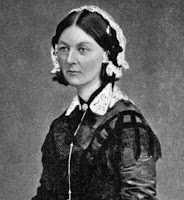Women in Irish Medicine. Part I: Background
Following on from last weeks' posts looking at the role in Catholics in Irish medicine, this post is the first in a series looking at the role of women in medicine. Again this post is based on one of the exhibitions staged as part of this year's National Heritage Week Open Day.
In 1858 the UK parliament passed the Medical Act which, for the first time, regulated which medical qualifications were valid in the UK. All those who held one of these recognised medical qualifications were to be entered into the Medical Register. The Medical Act only recognised medical degrees from universities in the British Isles, and as women were not allowed to study at these universities, it officially excluded women from the medical profession. The following decades saw an increasingly vocal campaign to allow women access to the medical profession.
The main arguments against women's involvement in medicine were based on contemporary views of women, which saw them as physically, mentally and emotionally weak. In October 1873 The Irish Times commented that women lacked the 'firmness, promptness of decision, and muscular strength' needed to be doctors.[1]
Women practicing as doctors also went against the Victorian domestic ideal, as it would allow women to leave their home, husband and children to pursue a career.
'A man's home should be to him also a rest. Will it be much of this with his wife in and out all day, called up at night, neglecting the household management and leaving the little one to the care of the servants? I think not.'[2]
 |
| Florence Nightingale |
Within the medical profession there was opposition from doctors who feared additional professional competition. This was especially the case with obstetricians, as this was the area where women were expected to specialise. Many also thought that if women must insist on a career in medicine, it should be restricted to the traditional role of nurse.
Those in favour of the medical education for women countered these arguments claiming that women's nature in fact made them more suited to being doctors, as women were by nature caring and compassionate. Examples of medical women from Ancient Greece to Europe in the Middle Ages were also put forward.
 |
| Thomas and Anna Haslam |
A major argument put forward was the demand amongst women for female doctors, who could better understand and empathise with their problems. Thomas Haslam, an Irish suffragist, wrote that
'It is a melancholy fact that sensitive women often lose their health, sometimes even their lives, through an invincible repugnance to confide their aliments to a male physician, and that many valuable lives might be saved to the community if such persons had had skilled practitioners of their own sex to whom they could speak without a breach of their instinctive delicacy'.[3]
I am extremely grateful to Dr Laura Kelly, National University of Ireland, Galway, for sharing her research in this area with me.
[1] Irish Times, 16th October 1873
[2] 'A lady on lady doctors', Lancet, 7 May 1870
[3] Thomas Haslam, Letter to the Editor, Freeman's Journal, 2nd February 1871